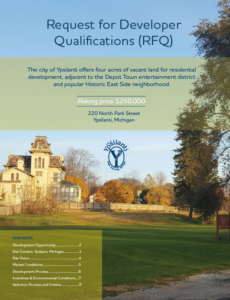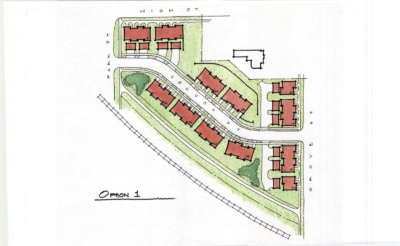Earlier this week, the city of Ypsilanti released an RFQ seeking developers for one of the sites they identified as a priority through the Redevelopment Ready Communities process. The League created the RFQ document with the support of Beckett & Raeder, Inc., as part of a project, funded by MSHDA through the MML Foundation, to advance placemaking planning into implementation.
Taking plans off the shelf

The first of our development RFQ pilots, recently sent out by the city of Ypsilanti.
“Planners can make all the plans they want, but it takes developers to execute them.”
This quote on the relationship of city planners to developers in creating communities has stuck with me as much as anything else from planning school. That’s why I’m enthusiastic about these RFQs.
When a community undertakes a PlacePlan, or prepares a residential target market analysis, or undertakes any kind of planning process, they are defining their desired outcomes; a community that goes through RRC then lays the groundwork to ensure they’re not hindering their desired outcomes.
To accelerate the actual completion of these plans, though, the community needs to clearly and actively communicate their expected outcomes, and the work they’ve done. This is the role our RFQs can play.
Traditional stumbling blocks
This project began from a less specific desire to accelerate developments that contribute to a local sense of place, and we arrived at supporting locals with RFQs after conversations with some of our PlacePlans alums, developer partners, and MSHDA and MEDC staff about why things hadn’t worked in the past. Some themes included,
- Developers often aren’t familiar with the work communities have done traditional real estate listings don’t elevate that groundwork or communicate the vision.
- Communities sometimes default to their known procurement processes when trying to communicate with developers, burying the lede under reams of legal requirements and disclosure documents. “Every page has to keep you reading, and if you see it’s 100 pages, you’re not even going to pick it up,” was feedback we got from a broker’s perspective.
- Local staff don’t have good channels for getting word out about their development priorities: often, they only know a small pool of local builders (or may even lack that!) and don’t know where to find others. “We created an RFQ and put it on our website and sent a press release to the local paper-we don’t know if anybody saw it.” said one city.
- Similarly, smaller developers may only know the opportunities in their own backyards, and not those just a few communities down the road; larger developers may only have a limited set of “high-profile” places on their radar.
Improving the outreach
The approach we’re taking has two parts, to help address these gaps.
First, we identified a few communities that have been through the Redevelopment Ready certification process, that had identified priority sites in downtown or adjacent neighborhood settings, had done good place-based planning (through PlacePlans or otherwise), had a target market analysis to demonstrate opportunity, and, importantly, had staff capacity to engage.
We are working with those communities to digest the work they’ve already done and tease out the important bits that relate to the target site. We’ve engaged Beckett & Raeder to both prepare concept site plans that provide visual cues of what the community is looking for, and to prepare site-specific fiscal analyses that test those visions against market data-can the community reasonably expect their vision to be buildable as-is, or should they expect a financial gap that will need incentives? And we’re packaging that work into an attractive RFQ document that (hopefully) grabs interest.

BRI prepared three concept site plans for the site, which we vetted with staff and the appointed bodies (Planning Commission and Historic District Commission) that will need to approve any development. The concepts are provided in the RFQ as examples of the city’s desired development, but kept general enough to allow the developer creativity.
Second, we’re working on the pipeline issue with support from a number of partners. Both the Michigan chapter of Urban Land Institute and the Home Builders Association of Michigan are promoting these RFQs to their membership, and we’ve also compiled our own contact list of firms active in placemaking-friendly development around the state-over 100 so far, and we’ll continue to expand that. Looking past these initial projects, MEDC has identified a need to expand the developer community active in any given region, through both networking and training, and we’re working with them to help target that need.
As we start to get feedback, we expect we might need to refine either what goes into the RFQ documents, or our approach to targeting developers. Our goal is to figure out a few things that work, and provide some guidance to all of our members about how they can take advantage of it to see their own placemaking goals take shape. Stay tuned!

